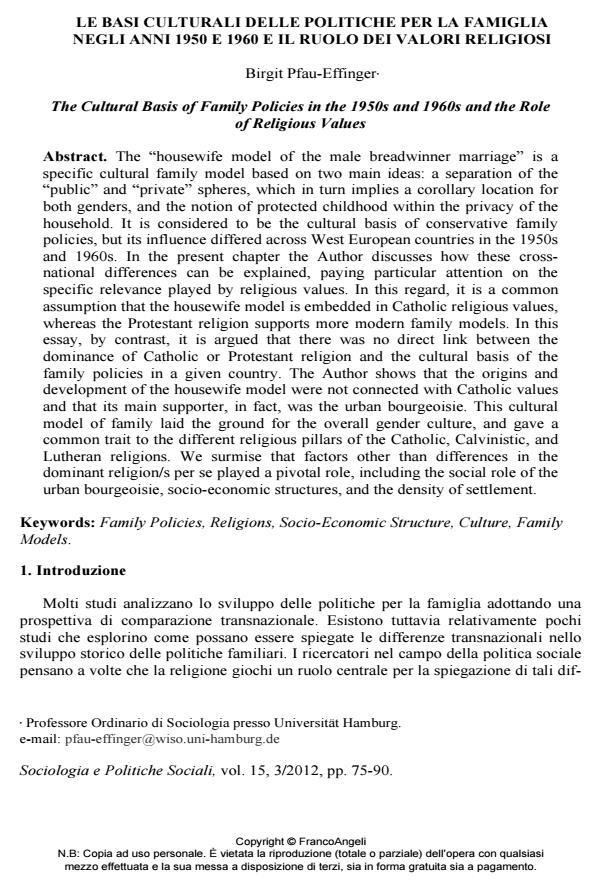The Cultural Basis of Family Policies in the 1950s and 1960s and the Role of Religious Values
Journal title SOCIOLOGIA E POLITICHE SOCIALI
Author/s Birgit Pfau-Effinger
Publishing Year 2013 Issue 2012/3
Language Italian Pages 16 P. 75-90 File size 241 KB
DOI 10.3280/SP2012-003006
DOI is like a bar code for intellectual property: to have more infomation
click here
Below, you can see the article first page
If you want to buy this article in PDF format, you can do it, following the instructions to buy download credits

FrancoAngeli is member of Publishers International Linking Association, Inc (PILA), a not-for-profit association which run the CrossRef service enabling links to and from online scholarly content.
The "housewife model of the male breadwinner marriage" is a specific cultural family model based on two main ideas: a separation of the "public" and "private" spheres, which in turn implies a corollary location for both genders, and the notion of protected childhood within the privacy of the household. It is considered to be the cultural basis of conservative family policies, but its influence differed across West European countries in the 1950s and 1960s. In the present chapter the Author discusses how these crossnational differences can be explained, paying particular attention on the specific relevance played by religious values. In this regard, it is a common assumption that the housewife model is embedded in Catholic religious values, whereas the Protestant religion supports more modern family models. In this essay, by contrast, it is argued that there was no direct link between the dominance of Catholic or Protestant religion and the cultural basis of the family policies in a given country. The Author shows that the origins and development of the housewife model were not connected with Catholic values and that its main supporter, in fact, was the urban bourgeoisie. This cultural model of family laid the ground for the overall gender culture, and gave a common trait to the different religious pillars of the Catholic, Calvinistic, and Lutheran religions. We surmise that factors other than differences in the dominant religion/s per se played a pivotal role, including the social role of the urban bourgeoisie, socio-economic structures, and the density of settlement.
Keywords: Family Policies, Religions, Socio-Economic Structure, Culture, Family Models.
Birgit Pfau-Effinger, Le basi culturali delle politiche per la famiglia negli anni 1950 e 1960 e il ruolo dei valori religiosi in "SOCIOLOGIA E POLITICHE SOCIALI" 3/2012, pp 75-90, DOI: 10.3280/SP2012-003006